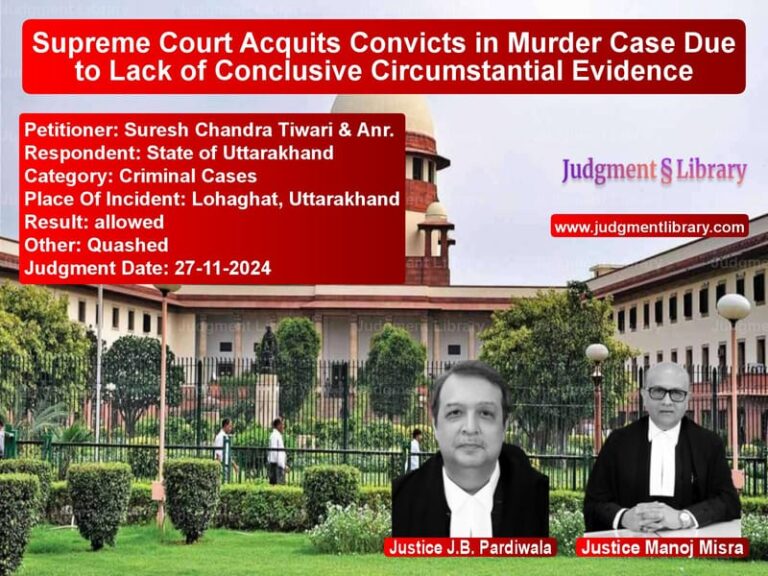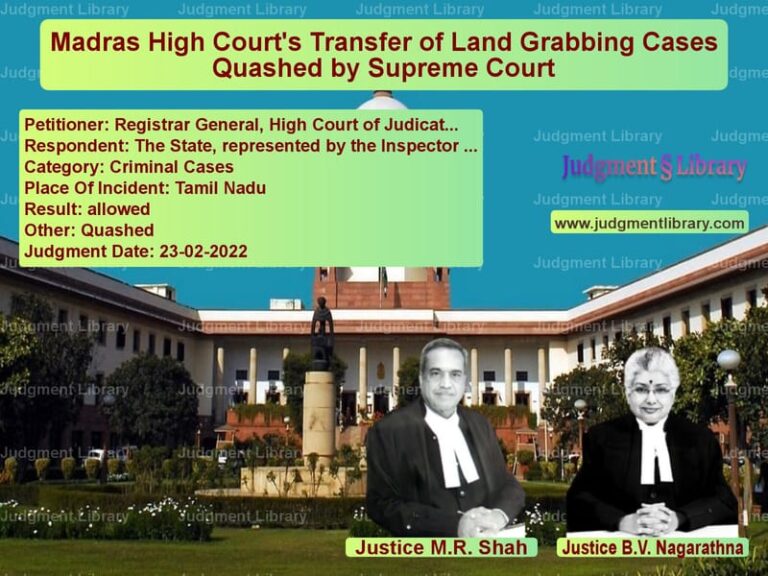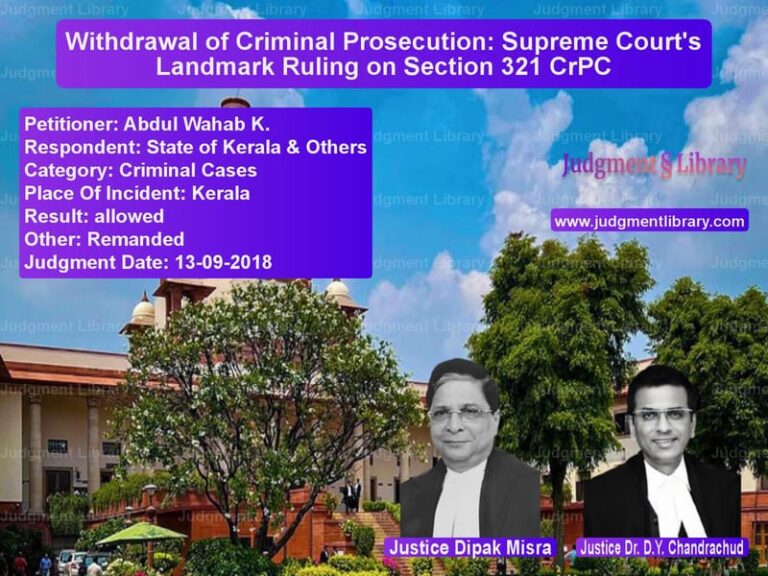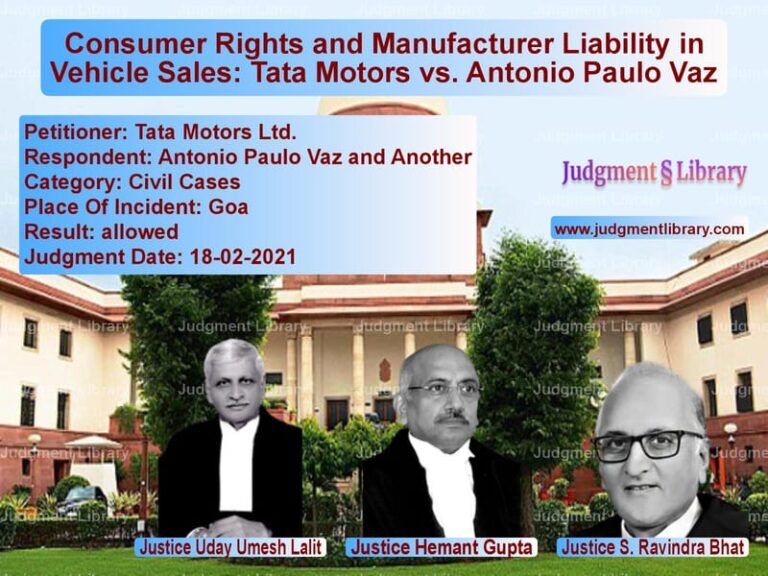SC/ST Act Acquittal: Supreme Court Remands Case for Fresh Consideration by High Court
The Supreme Court of India recently addressed a critical case involving allegations under the Scheduled Castes and the Scheduled Tribes (Prevention of Atrocities) Act, 1989. The case, Geeta Devi vs. State of Uttar Pradesh & Others, arose when the appellant challenged the acquittal of the accused under the SC/ST Act. The Allahabad High Court had summarily dismissed her appeal without proper reappreciation of evidence. The Supreme Court, in its ruling, quashed the High Court’s decision and remanded the case for fresh consideration.
Background of the Case
Geeta Devi, the appellant and victim in the case, alleged that she was assaulted and subjected to caste-based abuses by the accused persons. The complaint led to charges under Sections 354, 504, and 506 of the Indian Penal Code (IPC) and Sections 3(1)(x) and 3(1)(xi) of the Scheduled Castes and the Scheduled Tribes (Prevention of Atrocities) Act, 1989.
The Special Court hearing the case convicted the accused under Sections 452, 323/34, and 325/34 of the IPC but acquitted them of the charges under the SC/ST Act. The victim, dissatisfied with this partial acquittal, filed an appeal before the Allahabad High Court, which dismissed her plea in a single-page order without thoroughly evaluating the evidence.
Read also: https://judgmentlibrary.com/supreme-court-remands-caste-certificate-case-for-fresh-review/
Arguments by the Appellant
The appellant, represented by Advocate T.V. George, contended that:
- The High Court had not properly examined the evidence before dismissing her appeal.
- The testimony of the victim was disregarded without detailed scrutiny.
- The trial court had failed to consider crucial evidence regarding caste-based humiliation.
- The High Court merely endorsed the trial court’s decision without an independent evaluation.
Arguments by the Respondents
The State of Uttar Pradesh, represented by Advocate Adarsh Upadhyay, and the accused, represented by Advocate Shahid Anwar, argued that:
- The trial court’s judgment was sound and based on a fair assessment of the evidence.
- The absence of corroborative witnesses justified the acquittal under the SC/ST Act.
- The High Court had no compelling reason to interfere with the trial court’s ruling.
- The appeal was devoid of merit and should be dismissed.
Supreme Court’s Observations
The Supreme Court bench, comprising Justice M.R. Shah and Justice B.V. Nagarathna, critically examined the High Court’s decision. The Court held:
“The High Court has only made general observations on the deposition of the witnesses examined. However, there is no reappreciation of the entire evidence in detail, which ought to have been done by the High Court, being a first appellate court.”
“The High Court was required to reappreciate the entire evidence on record and also the reasoning given by the learned trial court. This has not been done.”
The Supreme Court stressed that in cases involving appeals against acquittals, the High Court has an obligation to conduct a comprehensive review rather than dismissing the appeal summarily.
Final Judgment
The Supreme Court quashed the High Court’s order and remanded the case for fresh consideration. The key directives included:
- The Allahabad High Court must reappreciate the entire evidence on record.
- The High Court must provide a reasoned judgment, detailing why the SC/ST Act charges should or should not apply.
- The appeal should be expedited to ensure timely justice for the victim.
Legal Implications
This ruling establishes significant legal precedents:
- Reappreciation of Evidence: High Courts cannot dismiss appeals against acquittals without detailed scrutiny of evidence.
- Due Process under SC/ST Act: Courts must ensure thorough consideration of caste-based atrocity claims.
- Victim’s Right to Appeal: The ruling upholds the principle that victims of caste-based crimes have the right to seek a thorough judicial review.
Conclusion
The Supreme Court’s decision reinforces judicial accountability in cases involving marginalized communities. By remanding the case for a fresh hearing, the Court ensures that the principles of justice and due process are upheld in SC/ST Act cases.
Petitioner Name: Geeta Devi.Respondent Name: State of Uttar Pradesh & Others.Judgment By: Justice M.R. Shah, Justice B.V. Nagarathna.Place Of Incident: Uttar Pradesh.Judgment Date: 18-01-2022.
Don’t miss out on the full details! Download the complete judgment in PDF format below and gain valuable insights instantly!
Download Judgment: geeta-devi-vs-state-of-uttar-prade-supreme-court-of-india-judgment-dated-18-01-2022.pdf
Directly Download Judgment: Directly download this Judgment
See all petitions in Fundamental Rights
See all petitions in Public Interest Litigation
See all petitions in Judgment by Mukeshkumar Rasikbhai Shah
See all petitions in Judgment by B.V. Nagarathna
See all petitions in Remanded
See all petitions in Remanded
See all petitions in supreme court of India judgments January 2022
See all petitions in 2022 judgments
See all posts in Constitutional Cases Category
See all allowed petitions in Constitutional Cases Category
See all Dismissed petitions in Constitutional Cases Category
See all partially allowed petitions in Constitutional Cases Category







